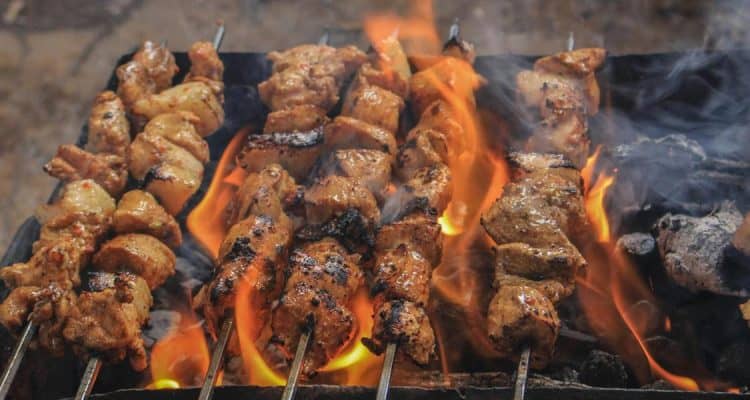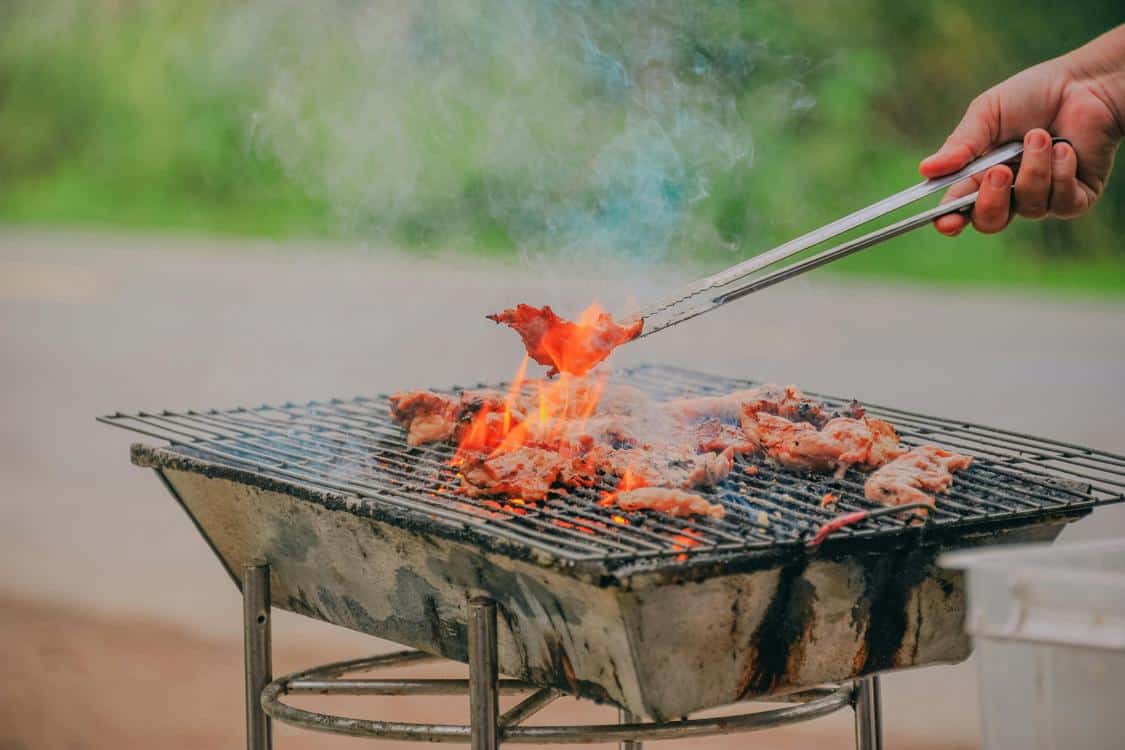
From coleslaw and potato salad to corn on the cob, grilled foods are a staple at cookouts. But if you’re not careful, you could end up with some tummy-turning symptoms as you deliver and install your new grill.
The grimy grates of a grill aren’t just greasy and smelly, they’re full of bacteria. To prevent food poisoning, you must clean your grill properly.
1. Leaving Food On The Side
While a BBQ is meant to be a fun time with friends and family, it is also important to follow some basic food safety rules. This is especially true in the summer when germs are multiplying at a faster rate. These mistakes can lead to food poisoning which causes diarrhea, stomach cramps and other unpleasant symptoms.
The main cause of BBQ related illnesses is undercooked meat and cross-contamination. This can be caused by letting raw meat touch cooked foods or by using the same utensils for both. To help avoid this, you should use a separate plate for your raw food and a different set of utensils for cooking. It is also a good idea to use separate chopping boards for raw and cooked food to prevent germs from spreading. You should also make sure to use a separate ice cooler box for your meat.
If you are using a charcoal grill it is a good idea to clean it before and after every use. This will help remove any lingering bacteria from the coals and can keep them from sticking to your meat. You should also make sure to scrub your grill with hot water and soap before starting to cook. The heat from the grill will also kill any bacteria and will make it easier to remove any burnt-on residue.
Another big mistake that people make is eating leftovers that have been sitting out for too long. This can cause food poisoning because it can contain dangerous substances such as heterocyclic amines and polycyclic aromatic hydrocarbons. These compounds can change the DNA of cells and may even be carcinogenic. This is particularly true if the meat has been grilled over an open flame, such as when you BBQ.
Other common mistakes include using ready-made salad dressings and marinades that often contain dairy products, such as mayonnaise. These can trigger a reaction for people with lactose intolerance. If you are unsure, it is always best to check the ingredients on the label before buying. Alternatively, look for dairy-free options. If you are not able to buy a dairy-free product, try using a vinegar or oil-based salad dressing instead of mayonnaise on your salads.
2. Not Washing Your Hands Before Cooking

There’s no better way to enjoy a summer BBQ than with the sizzle of juicy steaks, the aroma of mouthwatering ribs, and the taste of perfectly charred burgers. However, with all the joy of a barbecue comes the responsibility of keeping your grill clean.
A dirty BBQ is more than just an eyesore. It can also be dangerous to your health. That’s because bacteria that builds up on the grates can be transferred to your food. This can lead to some pretty serious digestive issues. Fortunately, there are some simple steps you can take to ensure your BBQ is always ready for the next party.
Start by washing your hands thoroughly with warm, soapy water. This is especially important before you touch any food, including fresh produce or raw meats. Be sure to rub your hands together and cover them with the soap for at least 20 seconds. This will help to reduce the spread of germs and bacteria.
It’s also a good idea to wear rubber or latex gloves while working with raw meats and other kitchen materials. This will prevent you from spreading any germs or bacteria onto other surfaces, such as your hands or the food you’re preparing.
Finally, make a habit of wiping down your appliances and tools after each use. This will prevent any built-up dirt and grime from contaminating your food or your BBQ.
When choosing a BBQ cleaning company, look for one that offers a wide range of services. This will ensure that your entire BBQ is cleaned thoroughly, from the grates to the burners and drip trays. You should also look for a company that has testimonials or feedback from previous clients. This will give you an idea of the level of service that a particular company provides and help you choose the right one for your needs. Finally, be sure to compare pricing structures between different companies. While cost shouldn’t be the only deciding factor, it’s important to find a company that offers a fair price for their services. This will help to keep your budget in check and ensure that you can still afford to enjoy your backyard barbecues this summer.
3. Not Cleaning Your Grill
Not only will a dirty grill spoil the flavor of your food, but it can also contribute to food poisoning. This is because if raw meats, veggies or contaminated skewers are left on the grill for too long, the resulting char can breed mold and other pathogens that can contaminate cooked food. Aside from that, a dirty grill can also increase the risk of cross-contamination. If the juices of a freshly cut piece of meat spill on the grates and aren’t removed before cooking other foods, these food particles can linger and contaminate the grilled meats and vegetables.
If you’re a regular griller, you should clean your grill after every use, or at least once a week. This includes removing and cleaning the grates, emptying the ashes, and scrubbing and rinsing the hood, burner tubes, heat deflectors, and other parts of the grill.
The most important thing to remember when cleaning your grill is to never forget to use rubber gloves. This is because grit, grease, and other residues can cling to your hands when you touch them. Additionally, it’s a good idea to wear gloves when you’re handling hot grill parts so that you don’t burn your fingers.
Aside from being a safety precaution, it’s important to clean your grill because food particles and excess grease can get stuck on the grates. Over time, these can impact how well your grill cooks and can cause a flare-up, which could burn your food or even start a fire.
When cleaning your grill, you should start by soaking the grates and bars in warm water. Then, you should scrub them using a stiff brush or scour sponge. After scrubbing, you should rinse the grates and dry them with a clean cloth. If you’re using a gas grill, you should also check the burner tubes to make sure they are free of clogs or debris. Finally, you should wash the inside of the lid and scrub the grill cover, if necessary. For a more thorough cleaning, you can always use a commercial cleaner. But if you don’t want to invest in a cleaner, a mixture of water and soap should do the trick.
4. Not Keeping Your Food Cold
If you are suffering from diarrhea, abdominal cramps or flatulence after a barbecue it could be because of food intolerance. You can be allergic to lactose, gluten, yeast or a variety of other ingredients found in many prepared foods and grilling sauces. In addition, if you are cooking for a crowd, cross-contamination is common. This happens when you use a utensil or plate that has touched raw meat and then uses it for something that doesn’t require cooking, like salad or fresh fruit. It can also occur when you cut raw vegetables, such as melons, over the rind, as this can transfer bacteria to the inside of the melon.
The best way to avoid getting sick from contaminated food is by keeping your BBQ and all of your kitchen equipment clean. This includes washing your hands before touching any food and using separate chopping boards, cutlery and plates for raw and cooked foods. You should never place a ready-to-eat meal and a raw burger on the same plate, even if they are not touching, as juices can run onto each other and make the plate dirty.
Similarly, you should not reuse marinades that have been used for raw meat as they can be a source of germs and bacteria. In addition, you should never put raw meat in a container with other foods such as tomatoes, mushrooms or onions as they may contain harmful pathogens.
Aside from keeping your grill clean, you should also keep it warm before you start cooking. This helps to kill off any bacteria that might still be present in the grates and on your cooking surface. You can use a wire brush or scraper to remove any stuck on food.
Finally, you should always cook in a well-ventilated area, as this will help to avoid breathing in any cleaning chemicals or fumes from the grill. Additionally, you should always read the safety instructions on any cleaning products before using them. It is also a good idea to wear gloves, goggles and long sleeves when cleaning a BBQ to protect yourself from chemical burns.
